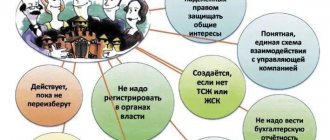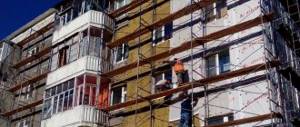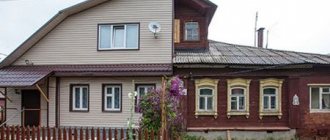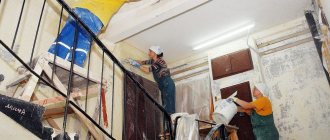Decisions are made by majority, ⅔ or 100% of votes
The quorum for making the majority of decisions at general meetings of owners of premises in an apartment building is fixed in Part 1 of Art. 46 Housing Code of the Russian Federation. This article provides several options for making positive decisions depending on the type of issue:
- by a majority of the total number of votes of the owners in the house participating in the meeting;
- 50%+1 vote of the total number of votes of all owners of premises in an apartment building;
- at least ⅔ votes from the total number of votes of the owners of premises in an apartment building.
In the Housing Code of the Russian Federation there is another option for the number of votes that owners must give for a question at the OSS in order for it to be accepted: 100%, that is, all owners in the house must vote “for” (Clause 1, Part 2, Article 44 of the Housing Code of the Russian Federation , part 1 of article 46 of the Housing Code of the Russian Federation).
The meeting is considered legitimate if it was attended by owners who have more than half of the total number of votes in the house (Part 3 of Article 45 of the Housing Code of the Russian Federation). Let's talk about how many votes are used to make decisions on issues that are most often brought up at general meetings of owners of premises in apartment buildings.
What the Ministry of Construction of the Russian Federation has changed in the requirements for the preparation of OSS protocols
3219646
Step-by-step instructions: how to hold a meeting among apartment building residents
To be more precise, the meeting is not held among residents, but rather the owners of residential properties of an apartment building. Only apartment owners can participate and vote at the meeting. Tenants in this case have no voting rights.
Step 1. Preparing documents for the meeting
This is the first step. Once completed, you can begin sending out messages about the upcoming meeting to other owners.
Required documents include the following:
- Notice of an upcoming meeting.
- Register of owners of premises in MKD.
- Forms of forms (owner decisions, protocols, etc.) and information materials.
It is advisable for the initiator of the meeting to contact Rosreestr for extracts in order to find out current information about the owners of residential premises in an apartment building, since they do not always provide information about changes in ownership to the governing body on time. At the same time, you need to check information about changes in the area of premises, redevelopments carried out, transfer of objects from residential to non-residential and vice versa.
Also, before sending out letters, you need to think through the agenda - the issues that will be discussed at the meeting.
The form of the meeting should also be thought out in advance, since this decision will depend on the text of the future letter and the voting procedure.
| Full-time | The personal presence of the owners of apartments in an apartment building is required. |
| Part-time | They can attend in person, or they can vote by studying the agenda in absentia. |
| Correspondence | The owners do not even meet in person, but convey their decisions to the address indicated when sending notices. Attached to the notice are voting forms for property owners in an apartment building. |
It is important to initially correctly determine the form of the meeting. In practice, there are situations when the initiator convenes a meeting in person, and when a quorum is not reached, he decides to hold it in absentia. At the same time, he forgets or deliberately decides to save time, and therefore does not notify the invitees about the holding of an absentee meeting. He also decides to formalize the results of both parts in one protocol. This is a fundamentally wrong approach.
If a situation occurs where a quorum is not reached at a meeting in person, a new meeting will have to be held. The owners must be notified separately regarding this, and a separate protocol must be prepared.
If you initially suspect that few owners will come to the in-person meeting, it is better to immediately choose the in-person format of the event. It will allow you to personally discuss problems with some of the neighbors, and then find out the opinion of the absentee owners in absentia through forms. In this case, you will not have to separately notify about the holding of several meetings and draw up different minutes - decisions on such a meeting are drawn up on one form.
Step 2. Notifying owners about the upcoming collection
According to Part 4 of Art. 45 of the Housing Code of the Russian Federation, it is necessary to notify the owners of housing in an apartment building about the upcoming meeting no later than 10 days before its convening. The responsibility for sending out notifications lies with the initiator of the meeting.
The initiator can be:
- one or more owners of apartment buildings;
- State Public Institution “District Engineering Services” (if there is city property on the territory of the apartment building);
- local administration;
- management organization.
Important! The only correct way of notification is sending it by registered mail indicating the time, place and date of the meeting or handing it over to each owner against signature.
Some initiators post notices in public places - on information stands, at the entrance to the building, in elevators, etc. This can only be done if consent to this method of notification was expressed at a previous meeting in an apartment building, and this decision was reflected in the protocol.
Special attention is paid to the content of the notice. It should list:
- information about the initiators;
- form of conduct;
- date, time, place;
- issue/issues being considered;
- the order and place of familiarization with the materials.
In the case of absentee or in-person meetings, it is also necessary to indicate the last day for receiving decisions of apartment owners, as well as where and to whom they should be transferred.
During the distribution process, the initiator must maintain a register of notifications. It must contain the exact dates of notification to each owner. The date of notification by registered mail is the day the letter was sent.
In order to document the fact that notices were sent, receipts from the post office must be attached to the protocol in the future.
Step 3: Conduct a meeting
On the designated day and time at the designated place, the initiator or their group meets with other owners. According to Part 1 of Article 48 of the Housing Code of the Russian Federation, an authorized person can replace the owner, but his powers must be confirmed by a power of attorney certified by a notary.
Next, the number of people who came is usually immediately counted, since the meeting is considered valid only if more than 50% of the owners have gathered.
If there is no quorum (less than 50% arrived), an appropriate protocol is drawn up. There is no point in holding the meeting further, since it will be impossible to approve any decision, including the selection of the chairman and secretary. Therefore, everyone disperses, and the drawn up protocol is certified by the initiator of the convocation or their group. In the future, usually a convocation with the same agenda is initiated again, but in absentia.
If there is a quorum, the first thing at the meeting is to elect a chairman and secretary, a counting commission to count votes from among the owners who came.
After this, discussion of the agenda begins.
In accordance with Part 2 of Article 46 of the Housing Code of the Russian Federation, it is impossible to change, reduce or supplement the scope of issues under consideration (agenda) that were indicated in the notice at the meeting, even if the owners agree with this.
After the discussion, voting begins. On each issue, those present vote separately. Several issues cannot be put to one vote at once - the votes for each are counted separately and the results are summed up.
Those present have three options to choose from:
- "behind";
- "against";
- "abstained."
Owners vote by raising their hands. As an option, they are given ready-made forms in which they need to fill out a solution. The method is also chosen at the general meeting, taking into account the opinions of all those present. The votes are counted, the result is recorded in the protocol, to which all ballots are necessarily attached.
Step 4: Communicate the results of the meeting
The decisions taken and voting results are communicated to the owners of the premises by the initiator of convening the meeting. This must be done no later than 10 days from the date of their adoption (Part 3 of Article 46 of the RF Housing Code).
The owners of the premises decide directly at the meeting in what form and where this will be done. You need to choose a place that would be publicly accessible to everyone. As for the form, most often, in order not to write extra papers, they simply make a copy of the protocol. But sometimes it is decided that this will be a separate document in the form of a notice.
The decisions made are binding on all owners of the premises, regardless of whether they participated in the meeting or not, and also what decision they voted for.
At the same time, every owner has the right to appeal decisions that, in his opinion, violate his rights and interests.
Bodies to which decisions of the meeting can be appealed:
- Court. You need to contact the judicial authority at the location of the MKD. This can be done within 6 months from the day the owner learned or could have learned about the decision made. Of course, it is not a fact that the judicial body will necessarily overturn the decision of the meeting. Very often such claims are denied, arguing that:
- the plaintiff's decision could not affect the results;
- the violations found are not significant;
- the decision of the meeting did not entail losses for the plaintiff.
- Housing inspection. For example, in the capital this is the State Housing Inspectorate of Moscow. It is not within its competence to overturn decisions made at the meeting, but it can initiate litigation on its own behalf, representing the interests of the owner or their group.
Step 5. Document storage
According to clause 4 of Art. 46 of the Housing Code of the Russian Federation, all documents (minutes/forms of decisions) for the meeting are stored at the address chosen by the owners of the housing stock in the apartment building directly at the meeting.
Step 6. Transfer of documents to the management organization and State Housing Property Inspectorate
The initiator of the meeting must send its results to the management company. No later than 5 days from the date of receipt, she must redirect them to the State Housing Inspectorate.
Please note that it is not copies that are sent, but originals!
In addition, the results of the meeting must be posted in electronic format in the Housing Information System. This should be done by the management company/homeowners association/housing complex/housing cooperative. If they fail to post such information, they may be subject to a fine under Art. 13.19.2 Code of Administrative Offenses of the Russian Federation. The owners do not bear any responsibility for this.
Simple majority to approve mandatory issues
Mandatory for all general meetings are questions about the selection of the chairman, secretary of the meeting and members of the general commission. This group includes questions about the procedure in which owners are notified about the upcoming meeting and about the decisions made at the general public meeting, if the management organization, homeowners association or residents of the house want to change the procedure established in the Housing Code of the Russian Federation.
Also, meeting participants must determine where copies of the decisions and minutes of the OSS will be stored: this can be done once for all meetings or for each OSS separately.
On these issues, a positive decision is made by a simple majority of the number of votes of the owners present at the meeting, that is, 50% + 1 vote of the number of votes present at the meeting.
Rules for filling out the form. Conditions for declaring it invalid
The form can be filled out with any pen - the color does not matter. The main thing is that the mark opposite the selected option is clearly visible. The law does not put forward strict requirements for the symbol with which to indicate your choice. Usually the owner puts a cross or a tick.
A check mark is placed opposite only one option: “for”, “against”, “abstained”. If there is not a single mark or several are marked on one question at once, the form is considered invalid.
Also, the owner’s vote is not taken into account if the form does not include:
- information about the owner or his representative (“impersonal” voice);
- signatures of the person who voted.
Such a form is simply not taken into account when counting votes, that is, the owner loses the right to vote. Therefore, it is so important to comply with formalities when filling out the document.
A simple majority chooses the method of managing the house and the composition of the MKD council
The owners of each apartment building must decide how the house will be managed: directly, with the help of a management organization or an HOA/housing complex (Part 2 of Article 161 of the RF Housing Code).
The issue of choosing a management method is adopted at the general meeting of owners by a simple majority (Clause 4, Part 2, Article 44, Part 1, Article 46 of the RF Housing Code). The same number of votes should be cast for the organization proposed to manage the house, approval of the terms of the management agreement with the selected management organization, as well as for termination of the contract with the previous management organization if the owners decided to change the organization.
The owner must give 50%+1 vote to the OSS to approve the amount of payment for residential premises proposed by the management organization in accordance with the management agreement (Part 7 of Article 156 of the Housing Code of the Russian Federation).
A simple majority of votes of the owners present at the OSS is required to select the persons who will constitute the council of the apartment building and its chairman. But the chairman or council of the house can be given additional powers to make decisions on carrying out routine repairs of common property only with the consent of the owners who have 50% +1 vote of the total number of all votes in the house (Part 1 of Article 46 of the Housing Code of the Russian Federation, clause 4.2 Part 2 of Article 44 of the Housing Code of the Russian Federation).
Owners can grant the chairman of the council of apartment buildings additional powers to make various decisions on managing the house only if at least ⅔ of all votes in the house are cast for this decision (clause 4.3, part 2, article 44 of the Housing Code of the Russian Federation, part 1 Article 46 of the Housing Code of the Russian Federation).
If the OSS raises questions about establishing the amount and payment of remuneration to the chairman of the house council, then the decision must be supported by the owners who have a majority of the votes of the owners present at the OSS.
Psychology of OSS: Secrets of Conducting a Successful Meeting
120981
Conducting a meeting of owners online
New technologies dictate their own rules in the modern world. More recently, it has become possible to hold not only correspondence meetings, but also virtual ones, which represent something averaged between an in-person and correspondence event.
Currently, the “Electronic Home” project has been launched on the “Active Citizen” platform. It allows you to carry out online:
- meetings of owners of apartments in an apartment building;
- surveys among residents of apartment buildings;
- informing residents about surveys and innovations in the building.
A virtual meeting has the same legal force as a real one, but with one caveat:
the decision that this format of discussion is permissible is made in advance at a meeting in person.
If the possibility of online meetings was not discussed during the actual meeting, the results obtained via the Internet have no weight.
Using the service is quite simple - even a novice PC user can figure out the procedure. All you need is a computer, tablet or smartphone and registration on the Active Citizen resource. If you are the initiator of the survey, you must integrate your profile on the Active Citizen service with your account on the mos.ru website.
Important! This resource is reliably protected by blockchain, which makes it impossible to manipulate the results of surveys and votes of owners.
Issues regarding major repairs are decided by a simple majority, majority or ⅔ of all votes in the house
Questions on various aspects of capital repairs can also be partially classified as mandatory: almost all houses are required to decide on the method of forming a capital repair fund, and, if necessary, on carrying out such repairs. Therefore, owners in most apartment buildings must consider these issues at the OSS.
The number of votes required for a positive decision on various aspects of the overhaul depends on the nature of the issues. In order to make a decision on how the capital repair fund will be formed, who will open a special account, if this is how the owners decided to save funds for major repairs, the OSS participants who have a majority of votes from the total number of votes in the house must be in favor.
At least ⅔ votes in the house must be cast when establishing the size of the contribution for capital repairs and the size of the capital repair fund above the minimum and when agreeing on a loan or credit, the terms of the loan agreement and the person who will be authorized to issue such a loan (clause 1, 1.1- 1, 1.2, part 2, article 44 of the RF LC, part 1, article 46 of the RF LC).
But the main part of the issues on major repairs are adopted by a simple majority of votes from those participating in the meeting in accordance with clause 5 of Part 2 of Art. 44 Housing Code of the Russian Federation, for example:
- Approve the list of works and services, terms, estimates, contractor.
- Determine the procedure for providing payment documents for payment of contributions for major repairs.
- Determine the credit organization to open a special account, approve the text of the agreement with such organization.
Issues that can be considered at the meeting
During such events, owners of apartments in apartment buildings can resolve any issues related to landscaping and determining the procedure for using common property.
The most common topics on the agenda are:
- reconstruction, redevelopment and repair of a house and other joint property in an apartment building;
- expenditure of funds from the capital repair fund;
- choosing a method for forming a capital repair fund and the responsible person who will open the account and manage it;
- increasing contributions for capital repairs;
- owners receiving credit/loans for major repairs;
- determining the limits of use of the land on which the apartment building is located;
- improvement of the local area, installation of a barrier in the yard, organization of parking spaces;
- choosing a way to control the house;
- refusal of owners to participate in the renovation program;
- concluding agreements with service organizations;
- transfer of premises from residential to non-residential status;
- other questions about an apartment building.
If during the meeting additional issues arise that require resolution, they cannot be considered at the same meeting. That is, they cannot be added to the agenda at the time of discussion. To consider them, another convocation will have to be held. The secretary or initiator can write them down on a piece of paper so as not to forget, and then add them to the agenda when sending out notifications about a new meeting of homeowners in an apartment building.
The common property of the house is provided for use with the consent of ⅔ of all votes in the house
The common property in the house belongs by right of common shared ownership to all owners of premises in an apartment building, therefore the decision to provide it for use by third parties is made by ⅔ of all votes in such a house (clause 3, part 2, article 44 of the Housing Code of the Russian Federation, part 1 Article 46 of the Housing Code of the Russian Federation).
With this number of votes, the owners at the OSS decide to transfer for use a part of the land plot if it is part of the building’s property, for example, for laying communications, placing advertising, equipment or for other purposes.
⅔ votes of their total number in the house, decisions are made on the amount of payment for the use of the common property of the owners by third parties under concluded agreements and on granting the management authority the authority to conclude such agreements on behalf of the owners.
At the same time, the owners can approve the procedure and terms within which the management company will report to the owners on the execution of such agreements by a simple majority of the number of votes present at the OSS.
⅔ votes of all owners in the house are required to establish an easement on the land plot and the limits of its use in the event that the local area is registered in the cadastral register and included in the common property of the house (Clause 2, Part 2, Article 44 of the Housing Code of the Russian Federation).
10 mistakes when holding general meetings of owners
24645032
The reduction of common property must be agreed upon by all owners in the house
Common property in an apartment building can not only be provided for use by third parties or rented out, but also changed as a result of redevelopment, reconstruction, or the inclusion of new elements.
So, if the owner brings to the OSS the issue of reorganizing his premises, during which part of the common property of the house will be added to it, then such work requires the consent of all owners in the house, that is, 100% of the votes (Part 3 of Article 36, Part 2, Article 40 of the Housing Code of the Russian Federation). After all, they entail a reduction in the common property that belongs to all owners in the apartment building.
If the reconstruction or reorganization initiated by the owner of the premises does not entail a decrease or increase in the common property in the house, then such work requires the consent of the owners who own ⅔ of all votes in the house (Clause 1, Part 2, Article 44 of the Housing Code of the Russian Federation, Part. 1, Article 46 of the Housing Code of the Russian Federation).
Documents required for owner participation in the meeting
As mentioned above, only owners of objects in apartment buildings have the right to participate in voting. Landlords and other persons temporarily residing in apartments, but who do not have ownership rights to housing, are not allowed to attend the meeting. Therefore, in order for the apartment owner to confirm his status, he needs to take with him:
- Passport.
- Documents for the apartment.
- A notarized power of attorney from the owner, if his interests are represented by the principal.
If the owner sent another person with a power of attorney in his place, then a copy of it is attached to the protocol with the voting results.
According to paragraphs 3 and 4 of Art. 185.1 of the Civil Code of the Russian Federation, notarization of a power of attorney is a prerequisite . The only exception to this rule are situations when the power of attorney:
- certified by the educational organization or enterprise in which the owner of the property studies/works;
- issued by a medical institution where the principal is undergoing inpatient treatment.
It must contain the following information.
| For individuals | For legal entities |
| Full name | Full name |
| Location | Location |
| Passport | Constituent documents |
To introduce restrictions on the use of a land plot, you must receive at least 2/3 of the votes
Owners often have questions about how many votes should be cast in order to install a video surveillance system, fencing, landscaping and landscaping elements in the house.
Thus, if the OSS raises questions about the limits of use of the land plot on which the house is located, including the introduction of restrictions on its use, the installation of fences, decisions on them are made by a majority of at least 2/3 of the votes of the total number of votes of the owners of premises in the apartment building ( clause 2, part 2, article 44 of the Housing Code of the Russian Federation).
For the installation of flower beds, trash cans, a playground or a parking lot, in order for the owners to make a positive decision, they must cast a “for” majority of votes from the total number of votes taking part in this meeting (Clause 2.1, Part 2, Article 44 of the Housing Code of the Russian Federation, Part 1, Art. 46 Housing Code of the Russian Federation).
Also, by a majority vote of the total number of votes taking part in this meeting, the following questions, which are quite popular among the owners and management entities, are approved at the OSS:
- Installation of video surveillance and approval of tariffs for system maintenance.
- Establishment of a concierge service and approval of tariffs for payment of services.
- Installation of intercoms, automatic locking systems.
- Installation of motion sensors.
- Equipment of recreation areas in the local area: benches, tables.
How to choose an information system for voting on the OSS
4062635
Procedure for counting votes of owners
A proposal submitted for consideration is considered approved if more than half of those present vote for it.
That is, it is important to get 50% “for” not from the total number of owners to whom invitations were sent, but from the number of those who showed up.
Although there are exceptions to this rule:
- You need to get 50% of the votes from the total number of apartment owners in the apartment building in order to make a decision on:
- method of forming a capital repair fund;
- creation of a homeowners association;
- approval of its composition;
- At least 2/3 of the votes of all property owners in the house will be required to resolve issues about:
- the beginning of major repairs, disposal of funds allocated for this purpose;
- obtaining a loan or loan;
- the procedure for using the land plot and introducing restrictions;
- installation of advertising structures outside the MKD territory.
- An absolute majority (100%) is necessary when deciding on reducing the area of the common property of an apartment building.
The responsibility for counting the results is assigned to the counting commission. In this case, the protocol is drawn up by the secretary, and not by the members of the commission. This must be done no later than 10 days from the date of the meeting.
In practice, questions often arise about how to count the votes of owners who own apartments on the basis of shared ownership. In fact, everything is extremely simple: the number of owners in the apartment - the number of votes.
Example. If the object is the joint property of three people, then each of them is invited to the meeting. Each person's votes are considered separate and legally equal to other votes. In this case, two other owners can write a power of attorney for the third, and he will vote for them at the vote. That is, he will have to give 3 votes at once.
But if the same person owns several premises, such an owner can vote only once, regardless of the area that is in his possession (but such an area must be indicated in the ballot!).
The protocol must contain information:
- date and document number;
- date, place and form of the meeting;
- data of the initiators of the event;
- agenda;
- list of invited and actually present persons;
- storage location for protocols indicating the exact address;
- data and annexes to the protocol.
Before drawing up, we recommend that you familiarize yourself in detail with the provisions of the Order of the Ministry of Construction and Housing and Communal Services of the Russian Federation dated January 28, 2019 No. 44/pr, which specifies the requirements for document execution.
Issues of payment for utility services are resolved at the OSS by a simple majority
Since the entry into force of No. 59-FZ, owners of apartment buildings have the right to the OSS to decide to switch to direct contracts with resource suppliers, excluding the building management organization from the process of providing utilities.
Issues regarding the conclusion of direct contracts with resource supply organizations for the supply of utility resources to the premises of the owners are approved by a simple majority: 50% + 1 vote of those present at the meeting.
The same number of votes is required to approve the texts of agreements with resource suppliers, as well as an agreement with a regional operator for the management of municipal solid waste.
Separately in this group, for decision at the OSS, we can highlight the issue of the procedure for determining the amount of payment for utility resources supplied to the house for the maintenance of the common property of the owners. Owners can approve the calculation of fees based on the standard, average monthly consumption or ODPU readings by casting “for” more than 50% of the total number of votes of OSS participants.
The majority at the meeting approves the information system for absentee voting
The Housing Code of the Russian Federation provides for the possibility at a general meeting of owners to approve the use of information systems, including the GIS housing and communal services, for conducting the following OSES, to select an administrator for the general meeting (clauses 3.2 - 3.4 of part 2 of article 44 of the Housing Code of the Russian Federation).
The following issues are adopted by a simple majority at the OCC:
- Selecting an information system for absentee voting and an OSS administrator.
- Approval of the procedure for the administrator to accept decisions of owners and the timing of voting in absentia using the system.
- Approval of the Regulations on the procedure for conducting OSS using the selected information system.
Entrust the collection of decisions and counting of votes to the “OSS 100%” service and the “My Apartment” information system
It is not always easy to prepare documents with the correct wording of agenda items and correctly count the votes of owners at the OSS. Our “OSS 100%” service will come to the aid of managing organizations, homeowners associations and residential complexes, which will help you automatically generate a notice of the upcoming meeting, obtain a register of owners, prepare a voting ballot and draw up a protocol with the voting results.
In this case, the MA may invite owners to agree on the use of the “My Apartment” information system for absentee voting. This will greatly simplify the life of the management company and the owners.
Try holding a general meeting of premises owners in an apartment building using the “OSS 100%” service and using the “My Apartment” information system. We are sure you will see the difference.









